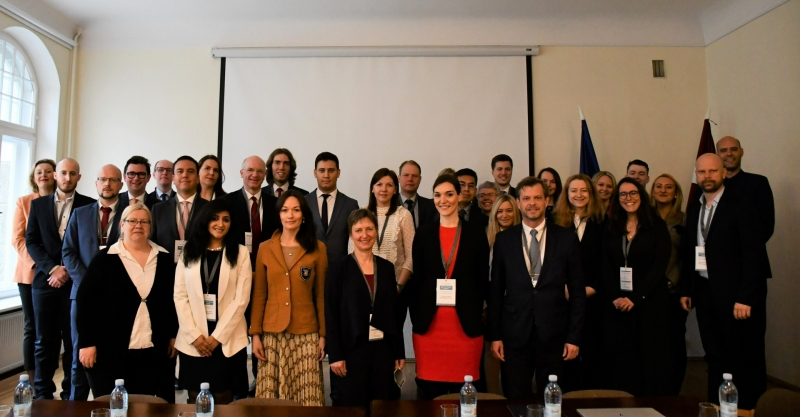An international workshop for competition law experts, co-organized by the Organization for Economic Co-operation and Development (OECD) and the Competition Council of Latvia (the CC), took place in Riga on 11 and 12 May. This capacity-building workshop addressed competition enforcement against hub-and-spoke arrangements, and experts shared their experiences and gained in-depth knowledge of hub-and-spoke arrangements while also sharing the practice of various world jurisdictions in investigating and preventing these cartels.
Hub-and-spoke arrangements are horizontal restrictions on the supplier or retailer level (the “spokes”), which are implemented through vertically related players that serve as a common “hub” (e.g., a common manufacturer, retailer, or service provider).[1]
Latvia is one of the few countries where the format of this type of cartel has been established. In 2017, the CC fined construction materials retailers and imposed a fine of 5.8 million euros for a long-term price-fixing and compliance with the artificially adjusted price level for gypsum (including gypsum board), lime cement mixtures and other products distributed in retail stores by SIA “Knauf” and for gypsum board distributed by SIA “Norgips”.
During the case investigation, the CC evaluated the existence of prohibited agreements between suppliers SIA “Knauf” and SIA “Norgips” as well as the biggest construction materials retailers SIA “DEPO DIY”, AS “Kesko Senukai Latvia”, SIA “Tirdzniecības nams Kurši” and SIA “Krūza”. In accordance with the facts established in the decision, the agreements were implemented in the form of vertical restrictions, when SIA “Knauf” and SIA “Norgips” determined the retail prices and level thereof for each of retailers, as well as in the form of horizontal cartel agreement – when retailers achieved mutual understanding and maintained the agreed pricing level for products of SIA “Knauf” and SIA “Norgips” on retail.
It was established that compliance with instructions of SIA “Knauf” and SIA “Norgips” was ensured by active actions of retailers, upon supervising the prices of competitors and notifying suppliers SIA “Knauf” and SIA “Norgips” on certain price deviations, requesting the producers to intervene and requesting to make pricing adjustments on the set pricing level. From the other part – the above-mentioned retailers were aware of the main idea, why it is important to keep set pricing level and why it is important that other competitors act accordingly with prohibited agreement.
At the seminar, participants shared their experience and insights in discovering and investigating a hub-and-spoke cartels, as well as discussed resale price maintenance cases with horizontal coordination, and hub-and-spoke and resale price maintenance cases with horizontal elements in the e-commerce context, and also case management issues. Experts from national competition authorities shared their insights on these topics, drawing from their practical experience and recent cases. In addition, participants had the opportunity to take part in practical exercises, aimed at applying the lessons learned throughout the workshop and at stimulating the discussion on specific points.
The seminar was attended by 33 experts from competition authorities from the United States, India, Turkey, Sweden, Poland, Great Britain, Mexico, Romania, Colombia, Austria, Hungary, Germany, Portugal, Ireland, Israel, Croatia, Lithuania, Estonia, and Latvia.
[1] https://www.oecd.org/daf/competition/oecd-ccl-workshop-on-hub-and-spoke-cartels.htm



